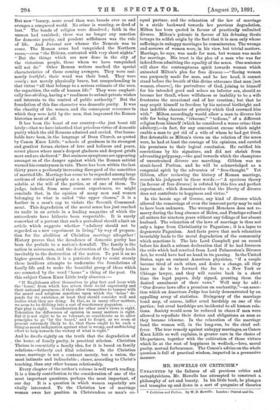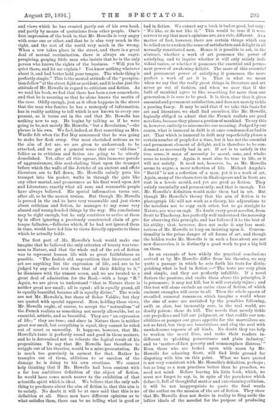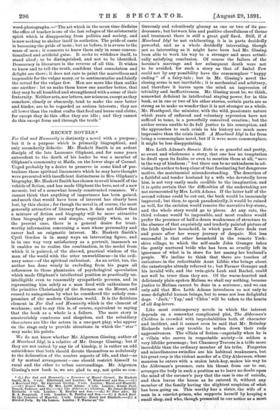MR. HOWELLS ON CRITICISM.*
UNDAUNTED by the failures of all previous critics and metaphysicians, Mr. Howells has attempted to construct a. philosophy of art and beauty. In his little book, he plunges and tramples up and down in a sort of quagmire of theories • Criticism and Fiction. By W. D. Howells. London : Osgood and Co. and views which he has created partly out of his own head, and partly by means of quotations from other people. One's first impression of the book is, that Mr. Howells is very angry with some one or other, and that he is also very much in the right, and the rest of the world very much in the wrong. When a row takes place in the street, and there is a great deal of mutual recrimination, there is always an eager, perspiring, gasping little man who insists that he is the only person who knows the rights of the business. " Will you be quiet there, and let me explain P You know nothing whatever about it, and had better hold your tongue. The whole thing is perfectly simple." This is the mental attitude of the "perspira- tion-fellow" at the street-fight or accident, and it is also just the attitude of Mr. Howells in regard to criticism and fiction. As we read his book, we feel that there has been a row somewhere, and that he is assuring us that he alone knows the merits of the case. Oddly enough, just as it often happens in the street that the man who fancies he has a monopoly of information, has in reality nothing to tell which is not known to every one present, so it turns out in the end that Mr. Howells has nothing new to say. He begins by talking as if he were going to be, not merely Mr. Howells, " but a Revolution,"—the phrase is his own. We feel, indeed, at first something as Mrs. Wardle felt when the Fat Boy announced that he was going to make her flesh creep. Our most cherished notions as to the aim of Art are, we are given to understand, to be attacked, and we get a general sense that our " old-time" follies as to criticism and fiction are going to be utterly demolished. Yet, after all this uproar, this immense parade of aggressiveness, this soul-shaking blast upon the trumpet before which the walls of the Jericho of an ancient and effete literature are to fall down, Mr. Howells calmly puts his trumpet into his pocket, walks in through the gate like any other mortal, and pronounces as his final word upon Art and Literature, exactly what all sane and reasonable people have always believed. His special information turns out, after all, to be the merest truism. But though Mr. Howells is proved in the end to have very reasonable and just views about criticism and fiction, he manages to say some very absurd and wrong-beaded things by the way. His conclusions may be right enough, but he only contrives to arrive at them by in effect ignoring a previously constructed chain of gro- tesque fallacies,—fallacies which, if he had not ignored them in time, would have led him to views directly opposite to those which he actually holds.
The first part of Mr. Howells's book would make one imagine that he believed the only criterion of beauty was true- ness to Nature, and that the whole end of the art of fiction was to represent human life with as great faithfulness as possible. " The foolish old superstition that literature and art are anything but the expression of life, and are to be judged by any other test than that of their fidelity to it," he dismisses with the utmost scorn, and we are treated to a great deal of admiration for the Real,—with a large "R." Again, we are given to understand " that in Nature there is neither great nor small ; all is equal: all is equally grand, all is equally beautiful, because all is equally divine." The words are not Mr. Howells's, but those of Senor Valdes ; but they are quoted with special approval. Now, holding these views, Mr. Howells ought, of course, to accept the " naturalism " of the French realists as something not merely allowable, but as essential, artistic, and so beautiful. They are " an expression of life ; " they are true ; and since in Nature there is neither great nor small, but everything is equal, they cannot be ruled out of court as unworthy. It happens, however, that Mr. Howells's taste is perfectly sound and good in these matters, and he is determined not to tolerate the logical result of his propositions. To say that Mr. Howells has therefore to wriggle out of his theories, would be a misrepresentation. He is much too genuinely in earnest for that. Rather he tramples out of them, oblivious to or careless of the -damage he is doing to his own creations. We cannot help thinking that if Mr. Howells had been content with a far less ambitious definition of the object of fiction, he would have come much nearer to the exhibition of that scientific spirit which is ideal. We believe that the only safe thing to predicate about the aim of fiction is, that this aim is to satisfy. No doubt it will be at once said that this is no definition at all. Since men have different opinions as to what satisfies them, there can be no telling what is good or bad in fiction. We cannot say a book is bad or good, but only : " We like, or do not like it." This would be true if it were correct to say that men's opinions are, as a rule, different. As a matter of fact, however, there are certain things which can be relied on to awaken the sense of satisfaction and delight in all normally constituted men. Hence it is possible to ask, in the abstract, whether a work of art possesses the power of satisfying, and to inquire whether it will only satisfy indi- vidual tastes, or whether it possesses the essential and perma- nent power of awakening delight. The more of this essential and permanent power of satisfying it possesses, the more perfect a work of art it is. That is what we mean when we say that the really great things in literature and art never go out of fashion, and when we aver that if the bulk of mankind agree to like something for more than one generation, it is sure to be good. It is, then, clear that it gives essential and permanent satisfaction, and does not merely tickle a passing fancy. It may be said that if we take this basis for art and literature, we shall find ourselves, like Mr. Howells, logically obliged to admit that the French realists are good novelists, because they please a portion of mankind. To say this is, however, entirely to misconceive our meaning. Judged by our canon, what is immoral in drift is at once condemned as bad in art. That which is immoral in drift may superficially please a certain number of people for a time, but it has not the essential and permanent element of delight, and is therefore to be con- demned as necessarily bad in art. If art is to satisfy in the true sense, it must of necessity be moral, sane, and whole- some in tendency. Again, it must also ba true to life, or it will not satisfy. It need not, however, be, as Mr. Howells seems to argue, a mere reflection of life. Michael Angelo's " David" is not a reflection of a man, yet it is a work of art. Again, many of the characters in Shakespeare and in Scott are cast in a heroic mould, and yet are good as fiction. They satisfy essentially and permanently, and that is enough. Yet Mr. Howells's definition would make them bad in art. Bnt though Mr. Howells's theory that the aim of fiction is to photograph life will not work as a theory, his adjurations to the novelists not to copy each other, but to go straight to Nature, are wise enough. No doubt every great novelist, from Scott to Thackeray, has perfectly well understood the necessity for observing this principle, and has followed it to the best of his ability; that, however, does not make it any less meri- torious of Mr. Howells to keep on insisting upon it. Conven- tionality is the prime danger of all forms of art, and though the hidden rocks Mr. Howells is in such a fuss about are not new discoveries, it is distinctly a good work to put a big bell on them.
As an example of how widely the practical conclusions arrived at by Mr. Howells differ from his theories, we may quote a passage in which he sets forth his tests for distin- guishing what is bad in fiction :—" The tests are very plain and simple, and they are perfectly infallible. If a novel flatters the passions, and exalts them above the principles, it is poisonous ; it may not kill, but it will certainly injure ; and this test will alone exclude an entire class of fiction, of which eminent examples will occur to all. Then the whole spawn of so-called unmoral romances, which imagine a world where the sins of sense are unvisited by the penalties following, swift or slow, but inexorably sure, in the real world, are deadly poison : these do kill. The novels that merely tickle our prejudices and lull our judgment, or that coddle our sen- sibilities or pamper our gross appetite for the marvellous are not so fatal, but they are innutritious, and clog the soul with unwholesome vapours of all kinds. No doubt they too help to weaken the moral fibre, and make their readers in- different to ' plodding perseverance and plain industry,' and to matter-of-fact poverty and commonplace distress.' " Even those who are looked upon with scorn by Mr. Howells for admiring Scott, will find little ground for disputing with him on this point. What we have quoted is not very consistent with Mr. Howells's definition, perhaps ; but as long as a man practises better than be preaches, we need not mind- Before leaving his little book, which, we must not forget to say, is, in spite of the paradoxes which deface it, full of thoughtful matter and entertaining criticism, it will be not inappropriate to quote the final words of the author on the mission of the art of fiction. They show that Mr. Howells does not desire in reality to fling aside the loftier ideals of the novelist for the purpose of producing word-photographs:—" The art which in the mean time disdains the office of teacher is one of the last refuges of the aristocratic spirit which is disappearing from politics and society, and is now seeking to shelter itself in msthetics. The pride of caste is becoming the pride of taste ; but as before, it is averse to the mass of men ; it consents to know them only in some conven- tionalised and artificial guise. It seeks to withdraw itself, to stand aloof ; to be distinguished, and not to be identified. Democracy in literature is the reverse of all this. It wishes to know and to tell the truth, confident that consolation and delight are there ; it does not care to paint the marvellous and impossible for the vulgar many, or to sentimentalise and falsify the actual for the vulgar few. Men are more like than unlike one another : let us make them know one another better, that they may be all humbled and strengthened with a sense of their fraternity. Neither arts, nor letters, nor sciences, except as they somehow, clearly or obscurely, tend to make the race better and kinder, are to be regarded as serious interests ; they are all lower than the rudest crafts that feed and house and clothe, for except they do this office they are idle ; and they cannot do this except from and through the truth."




































 Previous page
Previous page